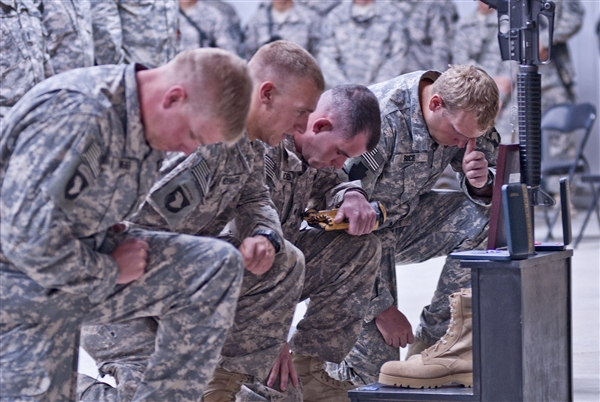SINGAPORE, June 1, 2012 — The chairman of the Joint Chiefs of Staff yesterday said he disagrees “in the strongest possible terms” with an Army major general’s characterization of suicide as a selfish act.
 |
| Here you can find more information about: |
“I’ve been in contact with Army senior leadership and know they share my concern,” Army Gen. Martin E. Dempsey said, regarding recent controversy over Army Maj. Gen. Dana J.H. Pittard’s blog comments, since retracted.
Dempsey spoke with American Forces Press Service while flying here for the Shangri-La Dialogue, an annual Asia security summit that begins today.
Pittard, commander of the 1st Armored Division and Fort Bliss, Texas, wrote the blog post in January after attending the memorial service of one of his soldiers, who took his own life. Pittard wrote that he is “personally fed up with soldiers who are choosing to take their own lives so that others can clean up their mess.”
Dempsey said the comments were “both unfortunate and extremely inappropriate.”
In retracting the remarks last week, Pittard expressed his “deepest sincerity and respect towards those whom I have offended,” noting suicide is a very complex issue that plagues not just the military, but society overall.
There have been 140 suicides across the services thus far in 2012, according to defense officials. This compares with 122 at this time last year, and 110 at this point in 2010. Among service members who have deployed to Iraq and Afghanistan, more have died by suicide than by enemy action.
The Army is the largest military branch and sees the most suicides, but the Navy, Marine Corps and Air Force as well as the Army have poured time, money, effort and training into programs and services aimed at stemming the tragic flood. Veteran suicides are also alarmingly high, at 18 per day as reported by the U.S. Department of Veterans Affairs.
“We’ve been hard at [combating suicide] for at least the last seven years,” the chairman said. “We have not spared any effort, but nor have we turned the trend line.”
Dempsey said he has spoken often and at length about the need for professional military members, from the newest recruit to the most senior officer, “to be very introspective at this point in our history about what a prolonged conflict, the longest war in our history, with an all-volunteer force, has done to us and to our families.”
“The issue of suicide, and all of the other tragic mental health issues that we have experienced over the last 10 years of war, require us to continue to seek to learn,” he added.
Senior leaders in particular are “accountable for helping the entire profession, the entire force, understand the issues,” the chairman said, adding that Pittard’s comments “didn’t help, but hurt, our efforts to understand. They added another layer of confusion.”
Leaders must help men and women who are experiencing “incredible stresses in their lives” get help, he added.
Dempsey said his approach is to ensure military leaders don’t address issues such as suicide in isolation.
“We’ve got … the issue of increasing suicides; we’ve got statistics that demonstrate sexual assault remains [an issue]; we’ve got an increase in reported instances of hazing,” he said. “Not all are related to war, but all are related to who we believe we are, and … what knowledge, skills and attributes we seek in the young men and women who serve — and the not-so-young men and women who serve.”
The chairman said his goal is to see those issues in context with each other, and to ensure recruiting, policies, education and training across the forces are managed to address the issues as effectively as possible.
“Over the last 10 years we’ve learned a lot about what attributes we may need for the future,” Dempsey said. “Are we, in our recruiting base, seeking them? In our education system, are we developing them? In our evaluation reports, are we rewarding them?”
The military is a wonderful profession of which he couldn’t be more proud, Dempsey said, yet there are now a number of “weak signals” that, taken together, emphasize the need for continued learning and change.
“Ultimately, we are responsive to the people of the United States of America and to the Constitution,” he said. “You’re not a profession just because you say you are, you’re a profession because you earn that title every day. This is another one of those instances where I think we’ve got to take a good hard look at ourselves.”
The chairman noted he often speaks of maintaining the bond of trust within the military.
Part of that bond rests in leaders paying attention to the mental health of service members, building in their troops a sense of resilience and the self-confidence that comes with “hard training, knowing you’re mentored, knowing you’re cared for, knowing there’s someone out there that cares about you and you’re part of a team,” he said.
Multiple pressures come to bear in the lives of service members and their families, Dempsey said.
“We’ve got to keep at this,” he said.
Source:
U.S. Department of Defense
Office of the Assistant Secretary of Defense (Public Affairs)

 von
von 